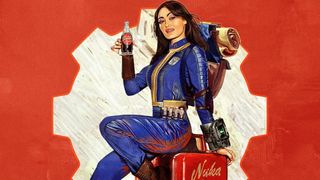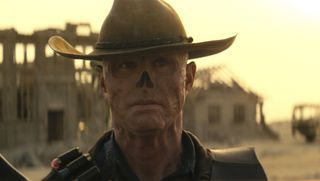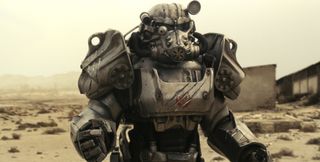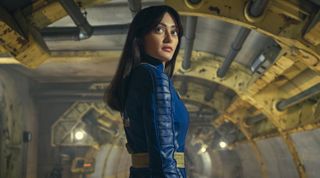Fallout TV show review: The best Fallout since New Vegas
Amazon's eight-episode series is the kind of quality adaptation that would have been unthinkable a few years ago.

"New videogame adaptation turns out not to be absolute catshit" isn't really headline news any more, is it? After Castlevania and The Last of Us and so on, the idea that a game adaptation might be good has stopped being shocking. Even Werewolves Within, the horror-comedy movie loosely based on Ubisoft's VR version of the social deduction game Werewolf, turned out great. Fallout isn't coming into a world where it's unbelievable that a videogame show might be worth watching. I'm just glad it doesn't buck the trend.
Part of what makes the TV incarnation of Fallout special is that it isn't just a story set in a familiar setting, but one that feels like a videogame story. Or maybe more like three videogame stories. Where some games in the Fallout series let you define your playthrough based on your approach to problem solving, your morality, or which faction you side with, Fallout the TV show explores that split by spreading it over multiple protagonists.
Lucy (Ella Purnell) is the naive Vault Dweller stepping out into the blinding light of a horrifying world, a character so innocent her catchphrase is a Ned Flanders "Okie-dokie!" Maximus (Aaron Moten) is a trainee in the militant Brotherhood of Steel who fully buys into their propaganda about protecting the world by hoarding pre-war tech. And the Ghoul (Walton Goggins) is a bounty hunter who took the Bloody Mess perk and sure does have a playstyle to match. The slow-mo when he shoots up a town makes it feel like he's using VATS.
While those three main characters get the most screentime, they're not the only thing going on. There's an escapee from the Enclave, extended flashbacks to Goggins' character in his pre-war life, and—in the same way Fallout 3 has things carry on in the Vault in your absence—Fallout the TV show has an entire B-plot where Lucy's brother Norm investigates the mystery of his home, Vault 33, and the connected Vault 32. It leads to a full-on spooky side story complete with Bethesda-esque environmental storytelling right down to the messages written on the walls, which is one of the best parts of the show.
Fallout (the show) really does feel like Fallout (the games), and not just because it has characters wearing Pip-Boys and power armor. It has a structure so familiar that when Lucy accepted a job to escort someone across the Wasteland I heard the rumble of a "mission accepted" notification in my head.
It helps that it nails the little details too. When Lucy modifies her Vault jumpsuit after spending some time on the surface, she adds a leather shoulderpad just like armored Vault suits have in the games. Characters eat Yum Yum Deviled Eggs and Blamco Mac & Cheese, pass a dilapidated Red Rocket and a Sunset Sarsaparilla factory, and the horrors are offset by ironic doo-wop. While the visuals owe a lot to Fallout 4 in particular, some of the deep-cut references that go all the way back to the original games. And of course there's a dog.

This won't stop the people who have been complaining about trivialities since the first trailer, like "the characters don't look dirty enough." Though there are plenty of scenes where people trudge across dustbowls with dried blood on their clothes from a previous fight, the color palette goes beyond brown and gray, which the realism brigade won't be happy about. Nor will the people who insist on having "what the NCR is up to" explained to them in episode one, or want the characters to take time out of the story to explain to the screen why they're using specific gun models, or whatever else the deep nerds have decided to fixate on. None of that would have made the show better, if you ask me.
PC Gamer Newsletter
Sign up to get the best content of the week, and great gaming deals, as picked by the editors.
Wild Wasteland
The final thing Fallout gets right is the tone, in a way that even the Fallout games sometimes don't. The TV show, for instance, treats the Brotherhood of Steel like the joke it's supposed to be. They're gung-ho and daft, more like bros than a Brotherhood, as you'd expect from the kind of isolationists who hark back to a fantasy Middle Ages with their paladins and clerics. The scenes where a Brotherhood squire and a knight try to cross the Wasteland in the TV show are more reminiscent of the movie Jabberwocky than an epic quest.

The Vault dwellers are seen as a joke by the wastelanders too, privileged naifs descended from the elitists who hid while everyone else suffered. Something post-apocalyptic fiction struggles with is how it accidentally validates the survivalist mindset. The Last of Us made its bunker nut Bill a decent guy, played by the loveable Nick Offerman, but Fallout doesn't let Vault dwellers off so lightly. Some of them are saps and some of them are manipulative, and the only ones who get to be heroes are the ones who rebel against their surroundings and the lie that hoarding resources and letting everyone else go hang is the way to survive.
Fun as it is to see our familiar world ruined by the apocalypse—and Fallout has some cool-looking moody shots of rusted fairgrounds and city streets—post-apocalyptic fiction is too often reduced to a predictable story of people making hard decisions to survive in a hard world and inevitably being hardened by it. Fallout pushes back on that idea. Lucy is set up to learn harsh lessons about the values she was taught in the Vault, but is also firmly a decent person who persists in her good karma playthrough regardless. There's none of the cynicism The Last of Us wallowed in, and while there may be plenty of goofy jokes and gory shootouts, Fallout has an unlikely message of hope, too.

The one thing I didn't like about Fallout was that it ended, and specifically that it ended without tying up all the loose ends. The eight episodes of this first season are less self-contained than I hoped, climaxing with a lot more setup for season two than I expected given how many streaming shows get canceled out of the blue. Season two seems likely to happen, and thank goodness for that, because I'm more excited to see where Fallout goes from here than I was after playing Fallout 4 or 76.

Jody's first computer was a Commodore 64, so he remembers having to use a code wheel to play Pool of Radiance. A former music journalist who interviewed everyone from Giorgio Moroder to Trent Reznor, Jody also co-hosted Australia's first radio show about videogames, Zed Games. He's written for Rock Paper Shotgun, The Big Issue, GamesRadar, Zam, Glixel, Five Out of Ten Magazine, and Playboy.com, whose cheques with the bunny logo made for fun conversations at the bank. Jody's first article for PC Gamer was about the audio of Alien Isolation, published in 2015, and since then he's written about why Silent Hill belongs on PC, why Recettear: An Item Shop's Tale is the best fantasy shopkeeper tycoon game, and how weird Lost Ark can get. Jody edited PC Gamer Indie from 2017 to 2018, and he eventually lived up to his promise to play every Warhammer videogame.

Josh Sawyer understands why some fans are annoyed by the treatment of New Vegas in Amazon's Fallout series, but he's not one of them: 'Whatever happens with it, I don’t care'

Coming up with 'skeleton outfits' was one challenge of being the Fallout show's costume designer: 'We dressed skeletons right and left'
Most Popular

